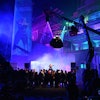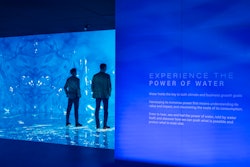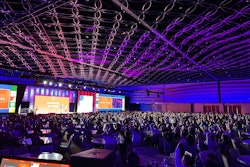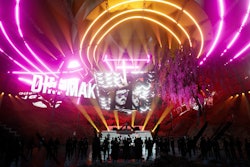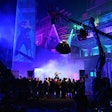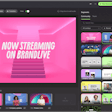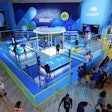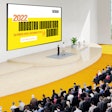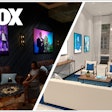
Lately, AI has dominated conversations in various industries, including meetings and events. But where does this leave event tech? During Connect Marketplace 2023 in Minneapolis, we posed this very question to an expert panel of event tech leaders, including Jessica Connolly, director of events for Hubilo; Michelle Kristoff, senior director of marketing for Community Brands; and Oliver Rowe, co-founder of VenuIQ.
Below are three highlights from their conversation on the future of event tech. (Watch their full discussion here.)
1. Hybrid is where events need to go.
This was something the panelists agreed on right off the bat. “We’ve seen the pendulum swing from all virtual when we really had to, and now back to this really heavy in-person [era]. But hybrid really is the best of both worlds, and that’s going to be essential for your year-round marketing strategy," Connolly said.
Yes, the last three years have proved that nothing can replace face-to-face gatherings, but that doesn't mean there's no room for event tech. "We’ve proved that nothing is going to match [in-person] in the virtual world. We tried. It didn’t work," Connolly added. "But what we also realized is with virtual, you have such a great reach to your target audience. Finding a way to blend those things together really is going to be the thing that drives your revenue."
Increased reach is also what Rowe is seeing with his customers at VenuIQ. "When you’re in person, there are people who can’t get there, and I think one of the biggest things that virtual did for our customers, especially from an event planner’s point of view, is it increased their reach, increased their data, increased the number of people that could access their event," he explained. "And I think one thing that will come to the forefront is that everyone’s trying to meet these climate and emissions goals over the next 20 years. I do think that’s going to play a part, especially with corporate events."
2. The data produced will become increasingly important.
Event tech can provide a plethora of helpful data, beyond just scanning people in and out of sessions with an event badge. “That data becomes critical because it helps not only the organizers make better decisions for next time, but for the attendees, you can do cool things for them within the app, agenda, or activations that are going on," Rowe said. "You can use that information live as it’s happening.”
Kristoff said registration is an important data point that event tech can provide. "When are people actually registering for your event? Are they doing early bird and getting those discounts? Or are they waiting up to the last minute?" she said.
Rowe added that VenuIQ's smart tracking is accurate and easy to use, and it can answer questions like: How long did an attendee stay? Who else was in the room at the same time? What did the attendees think of the session? Were the right people in the room for those sessions? "When you use those multiple points," he said, "you get really powerful data back."
Visitor flow management is another data point planners can explore with event tech, Connolly said. When printing on-site badges, you can figure out: Did you have enough kiosks? Where were attendees mainly coming in from? Which kiosks were being used more often than not? "We like to sit down with our clients and make sure we’re all looking at the data and can make better decisions for next year," she said.
She added, “There’s something to be said about finding a tech partner that you like that really is a partner and builds these relationships year after year, so you can find these insights out."
3. Price does not have to be a downside.
A common perceived downside of event tech is its cost, but these panelists agreed that the right event tech partner will meet you where you are. And it starts with what a planner's or event's true goal is.
"What does the client really want out of their event?" Kristoff always asks. "What do they perceive the need of their attendees to be versus what do they want? It might not need to be all of the bells and whistles if attendees will only use a small percentage of it. We’ll spend a lot of time with clients really making sure it connects with their attendees and that those elements get used, and then go from there."
It all comes down to transparency and honesty, Rowe and Connolly both explained. “If you find the right partner, they will hold your hand through it," Rowe said.
